Research suggests that parents have a large impact on their children’s religious behaviors.35 For example, there is considerable overlap between how often teens and their parents attend religious worship services (see Chapter 3). But what about religious beliefs? Do teens and their parents also tend to be in alignment on that front? For most families, the answer appears to be yes. About half of the parents surveyed say their teen holds “all the same” religious beliefs as they do, and another four-in-ten parents say their teen holds “some” of the same religious beliefs they do.
Do teens agree with this? Indeed, about half of teens ages 13 to 17 say their parent has all the same religious beliefs as they do. And, among teens whose responding parent says they have all the same religious beliefs, 76% give the same response. Additional analyses, however, show that among teens who say they have at least some different religious beliefs from their parent, a third report that their parent does not know their religious beliefs are different. And although about half of teens say they have at least some religious beliefs that differ from their parent’s, only 9% report that having different religious beliefs causes conflict in their family.
What do adolescents mean when they say their religious beliefs are different from their parent’s beliefs? Some common responses from teens are that they question some of the beliefs their parents hold, that they don’t like going to worship services as much as their parents want them to, that they are less strict or conservative than their parent, and that they don’t believe in God or in religion. Just 8% of teens whose religious beliefs differ from their parents’ report that they are more religious than their parent.
With increasing religious diversity in the U.S., interfaith marriages are now relatively commonplace. Their prevalence, however, varies considerably. Mainline Protestant and unaffiliated teens are about three times more likely than evangelical Protestant teens to live in an interfaith home. Although many teens follow their parents’ lead when it comes to religion, this plays out in various ways for teens whose parents differ in their religious identities. Some of these teens say they make their own decisions about what faith (if any) to follow, while others adopt the religion of the parent who is more interested in religion, and still others have parents who choose for them.
Half of parents say their teen has all the same religious beliefs as they do
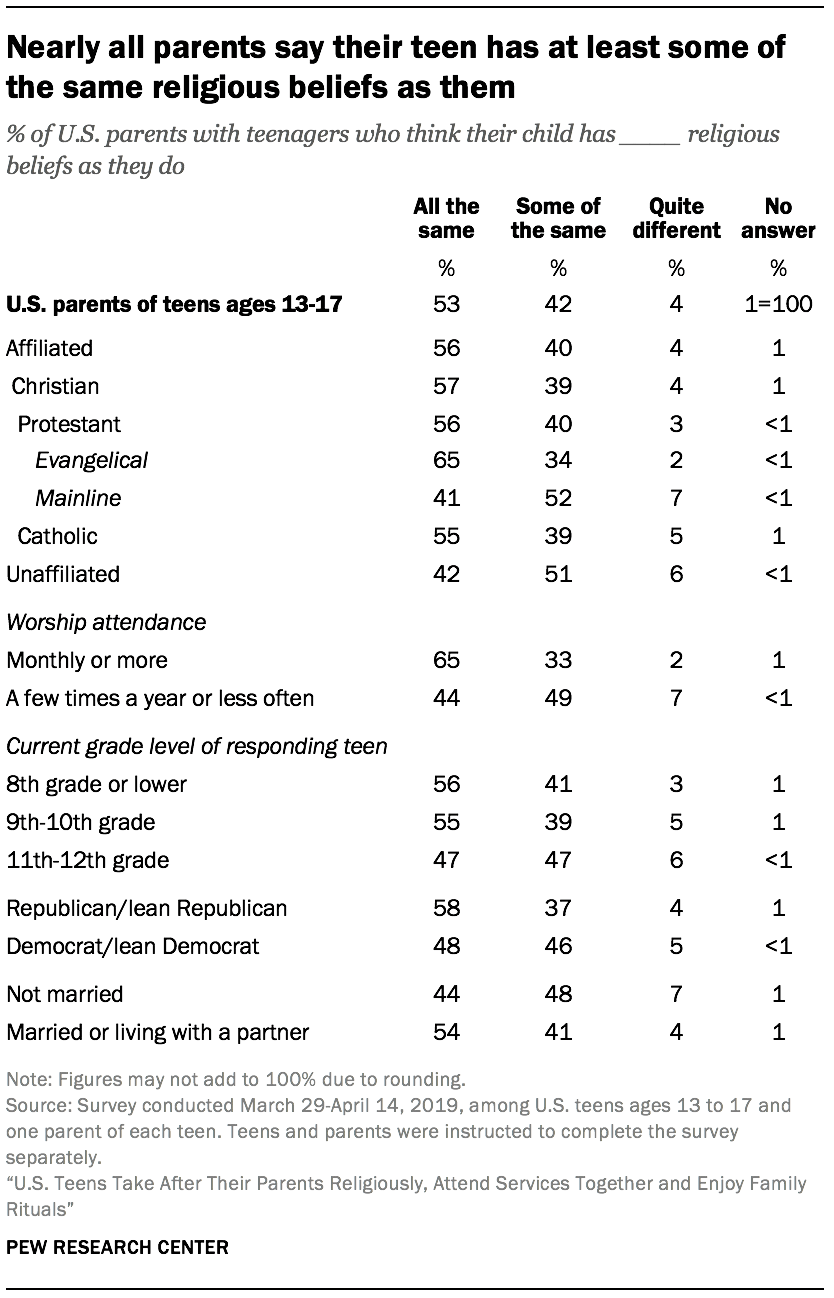 Many parents think that their teen’s religious beliefs are similar to their own beliefs. About half (53%) of parents who responded to this survey before handing it off to their teen say that teen has “all the same” religious beliefs as they do. Another four-in-ten (42%) report that their teen has “some of the same” religious beliefs. Few parents (4%) say the teenager slated to take the survey after them has “quite different” religious beliefs.
Many parents think that their teen’s religious beliefs are similar to their own beliefs. About half (53%) of parents who responded to this survey before handing it off to their teen say that teen has “all the same” religious beliefs as they do. Another four-in-ten (42%) report that their teen has “some of the same” religious beliefs. Few parents (4%) say the teenager slated to take the survey after them has “quite different” religious beliefs.
Mainline Protestant and religiously unaffiliated parents are relatively unlikely to think their teen shares all their religious beliefs. Just four-in-ten mainline Protestant and unaffiliated parents say their teen’s religious beliefs are completely the same as their own. By comparison, two-thirds of evangelical Protestant parents and 55% of Catholic parents say their teen’s religious beliefs are all the same as their own. Still, large majorities of parents across all the large religious groups analyzed in this report say that their teen shares at least some of their beliefs; no more than 7% in any religious tradition say that their teen’s beliefs are quite different.
Parents who regularly attend worship services are particularly likely to say their teen’s religious beliefs are similar to their own. About two-thirds of parents who attend worship services once or twice a month or more often (65%) say their teen holds all the same religious beliefs they do. By comparison, fewer than half of parents who attend a few times a year or less often (44%) report that their teen has all the same religious beliefs as they do. A similar pattern emerges among parents based on the importance of religion in their lives; those who say religion is very important to them are more likely to report that they and their teen share all the same beliefs.
Whether parents perceive their teens’ religious beliefs to be similar to their own also varies by partisanship and marital status. While 58% of Republican and Republican-leaning parents say their teen’s religious beliefs are the same as their own, fewer Democratic and Democratic-leaning parents think that’s the case (48%). And 54% of married and cohabiting parents say their teen shares all their religious beliefs, compared with 44% of single parents.
Parents of teens in higher grades are less likely than those of younger teens to say they share all the same beliefs. While 55% of parents with teens in 10th grade or lower report that their teen has all the same religious beliefs, fewer parents with teens in 11th and 12th grade (47%) say the same.
About half of teens say they have all the same religious beliefs as their parent
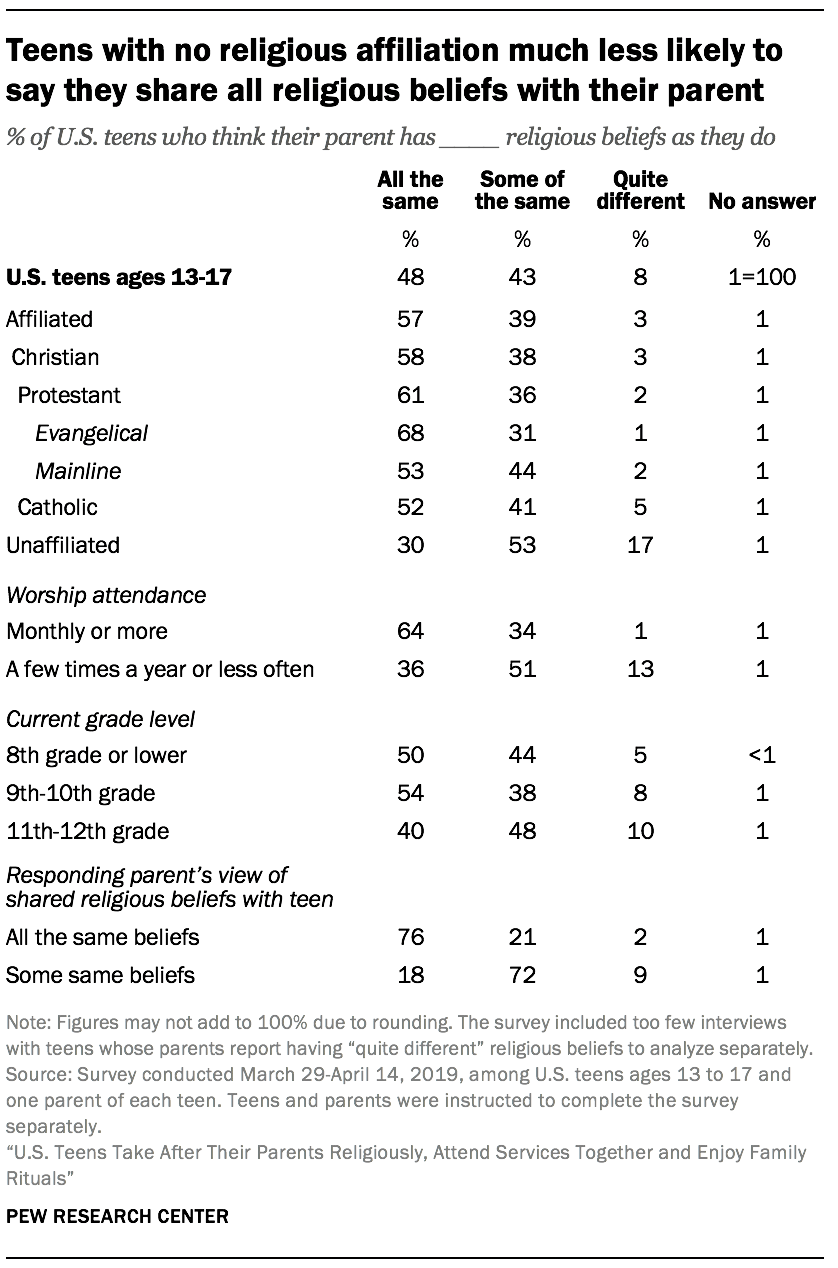 Just because parents believe they have the same religious beliefs as their children does not mean their children necessarily agree. Consequently, the survey also asked teens how similar they think their religious beliefs are to their parent’s (referring to the parent who participated in the survey). About half (48%) of adolescents ages 13 to 17 report that they and their parent share all the same religious beliefs. Nearly as many (43%) say they share some beliefs with their parent, while 8% say their parent has quite different religious beliefs.
Just because parents believe they have the same religious beliefs as their children does not mean their children necessarily agree. Consequently, the survey also asked teens how similar they think their religious beliefs are to their parent’s (referring to the parent who participated in the survey). About half (48%) of adolescents ages 13 to 17 report that they and their parent share all the same religious beliefs. Nearly as many (43%) say they share some beliefs with their parent, while 8% say their parent has quite different religious beliefs.
Parents and their teenage children are often – but not always – on the same page about whether they share the same religious beliefs. Three-quarters of teens with parents who say they have all the same religious beliefs agree with that assessment; still, one-in-five say they have only “some” of the same religious beliefs.
There are large differences across religious traditions in whether teens think they have all the same religious beliefs as their parent. Adolescents with a religious affiliation (57%) are almost twice as likely as unaffiliated adolescents (30%) to say they hold all the same religious beliefs as their parent, which may reflect the intergenerational growth of the unaffiliated.36 Indeed, as noted in the first chapter, teens are more likely than their responding parent to say they have no religious affiliation, which may reflect different beliefs. Among Christian adolescents, evangelical Protestants stand out in the opposite way. Two-thirds of evangelical teens say they have all the same religious beliefs as their parent, compared with 53% of mainline Protestant teens and 52% of Catholic teens who say this.
Whether teens think they have all the same religious beliefs as their parent also varies by their own rate of worship service attendance. Teens who say they attend religious services on a regular basis – that is, once or twice a month or more often – are far more likely than those who attend less often to say they and their parent share all the same religious beliefs (64% vs. 36%). Similarly, teens are more likely to report that they have all the same beliefs as their responding parent when they place a higher importance on religion in their life.
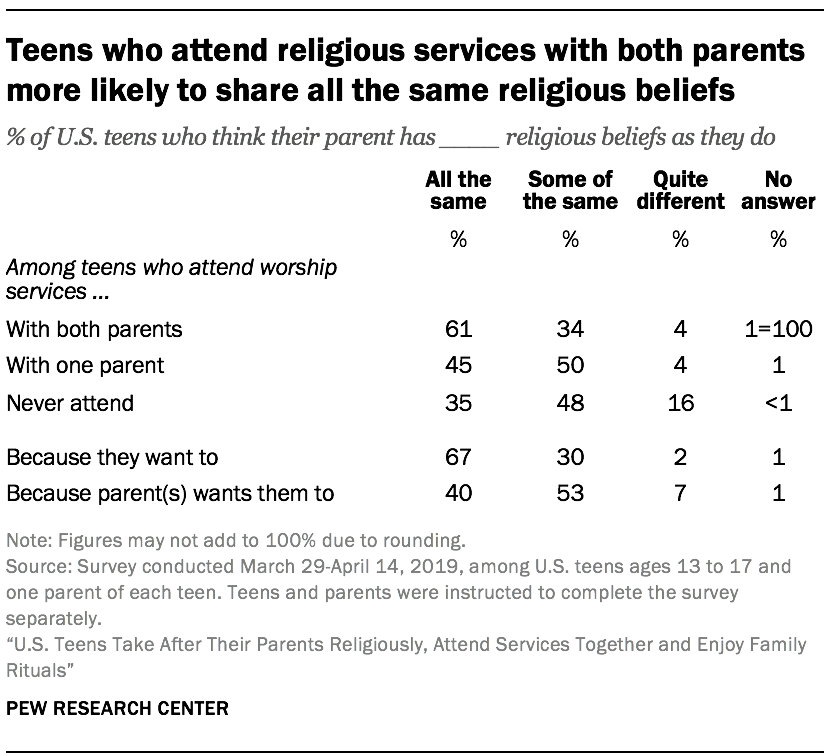 The perception of shared religious beliefs also varies by grade level. Four-in-ten teens in 11th or 12th grade report that their parent has all the same religious beliefs. By contrast, 54% of 9th and 10th graders and half of teens in 8th grade or lower say their parent has all the same religious beliefs as they do.
The perception of shared religious beliefs also varies by grade level. Four-in-ten teens in 11th or 12th grade report that their parent has all the same religious beliefs. By contrast, 54% of 9th and 10th graders and half of teens in 8th grade or lower say their parent has all the same religious beliefs as they do.
Teens who attend worship services with two parents are relatively likely to say their religious beliefs are all the same as the beliefs of the parent who took the survey before them. Six-in-ten adolescents who attend worship services with both parents say they have all the same religious beliefs as their parent, compared with 45% of those who attend with one parent and 35% of those who do not attend services. Teens who never attend religious services also are more likely than others to say their beliefs are quite different from their parent’s (16%).
Why teens attend worship services appears to be similarly important. Among teens who say they attend services mainly because they want to, two-thirds also report that their religious beliefs are all the same as their parent’s beliefs. By contrast, among those who say they attend because their parents want them to, just four-in-ten say they hold all the same religious beliefs their parent holds.
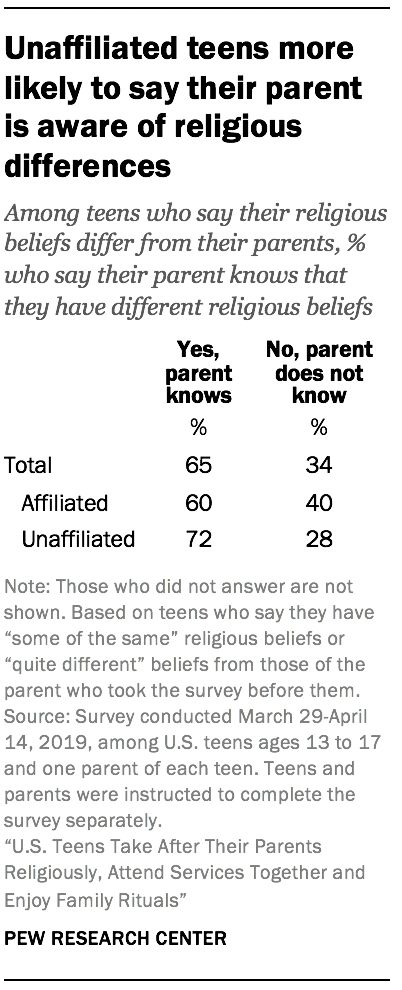 Teens who report having some of the same religious beliefs or quite different beliefs than their parent were also asked directly whether their parent is aware of those differences. Overall, most teens say their parent knows, but fully a third (34%) indicate that their parent is unaware of the differences. And teens who are affiliated with a religion are more likely than those who are unaffiliated to say that their parent does not know their beliefs are different (40% vs. 28%).
Teens who report having some of the same religious beliefs or quite different beliefs than their parent were also asked directly whether their parent is aware of those differences. Overall, most teens say their parent knows, but fully a third (34%) indicate that their parent is unaware of the differences. And teens who are affiliated with a religion are more likely than those who are unaffiliated to say that their parent does not know their beliefs are different (40% vs. 28%).
Most teens report little or no conflict over religion with their surveyed parent
What are the consequences of half of American teens saying that at least some of their religious beliefs are different from their parents? Overall, 9% of surveyed teens say their beliefs are different from their parent’s beliefs and that this difference causes conflict with their parent, compared with 35% who say it does not cause conflict, even though their parent knows they have different beliefs. When asked about the conflict caused by having different beliefs, 7% of teens say their parents are unaware of the differences.37 The remaining half of teens say that they share all the same religious beliefs with their parent (48%) or declined to answer the question (1%).
There is relatively little difference between teens from various religious traditions in this regard. Although unaffiliated teens (69%) are far more likely than affiliated teens (42%) to report that their religious beliefs are not all the same as their parent’s beliefs, they are not any more likely to report conflicts with their parents over those differences.
Teens who attend services mainly because their parents want them to are slightly more likely than those who attend of their own accord to say they have at least some religious conflict with their parent (13% vs. 7%). Very few teens (5%) who say they never attend religious services report that differences in belief cause conflict with their parent.
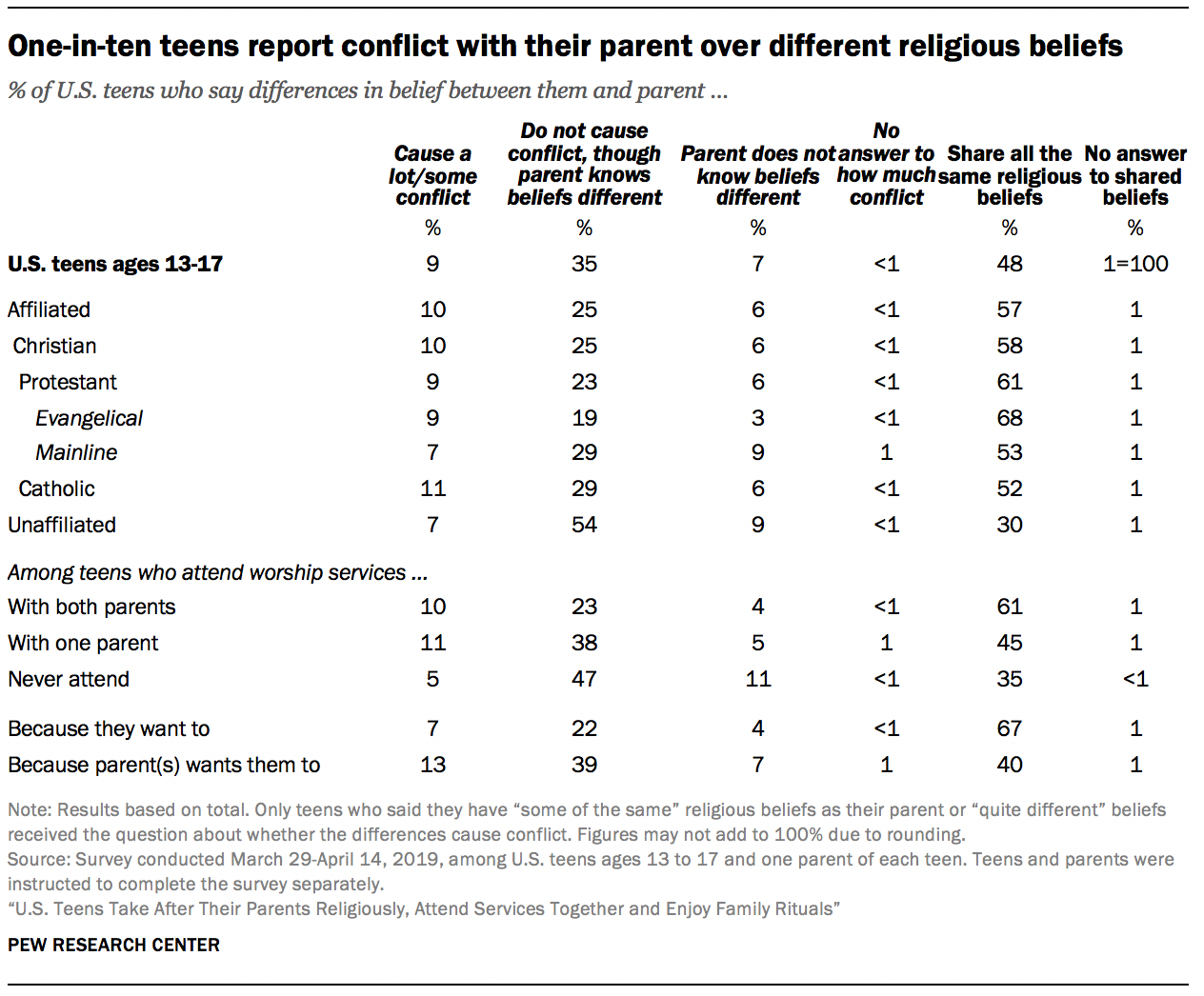
Four-in-ten teens with different religious beliefs from parent say they are less religious, less certain of their beliefs
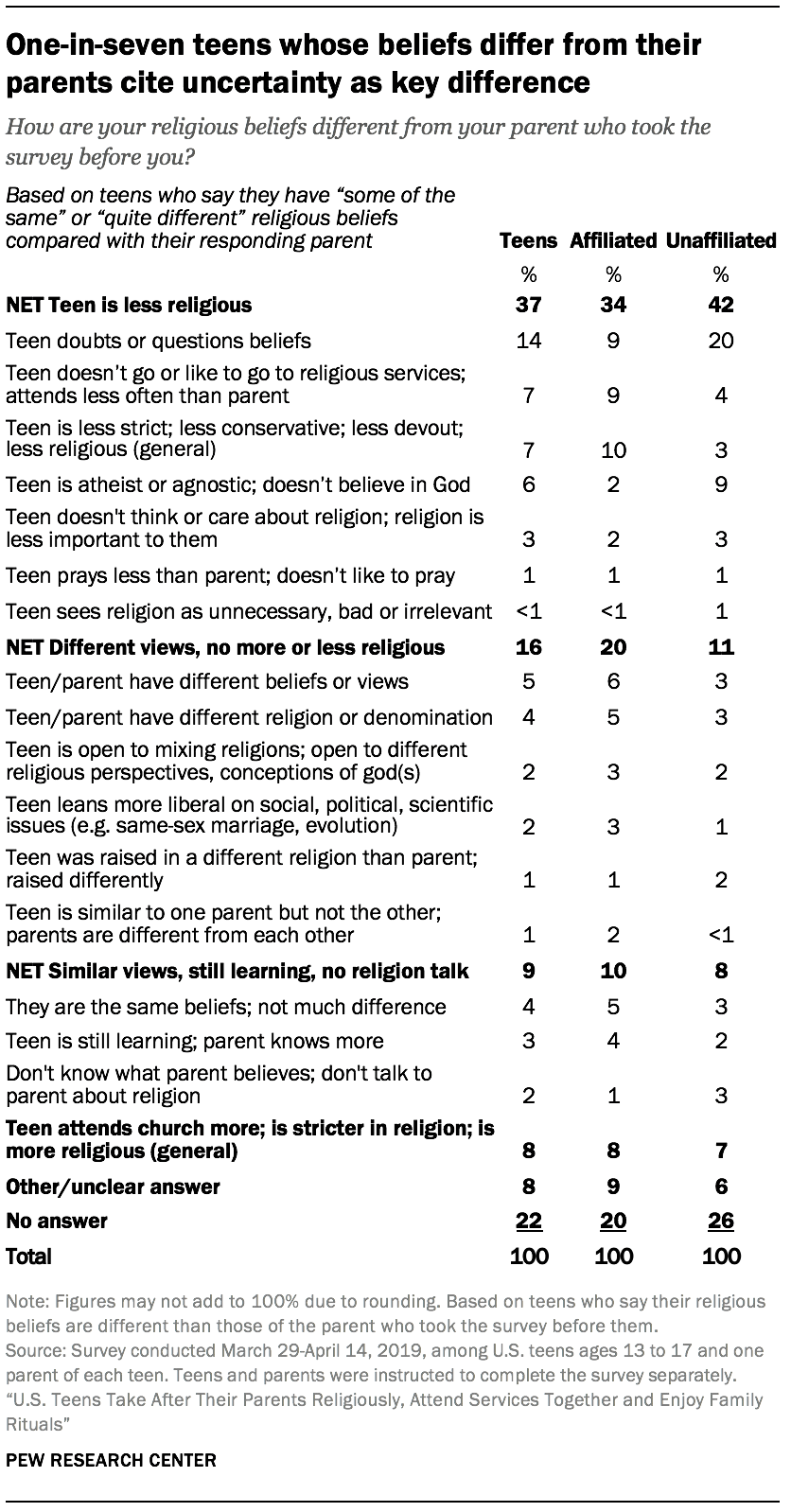 The roughly half of teens who say their religious beliefs are not all the same as their responding parent’s beliefs were asked to explain, in their own words, how their beliefs differ from their parent’s beliefs. Overall, 14% of the teens who got this question say that questioning or being unsure about their beliefs is what makes them different from their parent. Some of these teens discuss general uncertainty, such as one who said, “She definitely believes in a god and I’m not sure.” Others express more specific concerns, such as one teen who said, “Sometimes I just don’t believe in anything. Why does God let people die, or bad things happen to good people?”
The roughly half of teens who say their religious beliefs are not all the same as their responding parent’s beliefs were asked to explain, in their own words, how their beliefs differ from their parent’s beliefs. Overall, 14% of the teens who got this question say that questioning or being unsure about their beliefs is what makes them different from their parent. Some of these teens discuss general uncertainty, such as one who said, “She definitely believes in a god and I’m not sure.” Others express more specific concerns, such as one teen who said, “Sometimes I just don’t believe in anything. Why does God let people die, or bad things happen to good people?”
Uncertainty in belief is particularly relevant to differences between unaffiliated teens and their parents. One-in-five unaffiliated teens who report that their religious beliefs are different from their responding parent’s beliefs talk about uncertainty, compared with 9% of affiliated teens who report that their religious beliefs are different in this way.
Another 7% of teens who say their religious beliefs are different from their parent’s indicate that they are just less religious than their parent or that they are less strict or conservative than their parent. These responses include general comments such as, “My dad is probably more religious than I am.” Others give more specific answers such as, “My parents believe everything and try to live by God’s word. I sometimes don’t live by God’s word even though my parents think it’s not OK.” Such responses most often come from religiously affiliated teenagers. One-in-ten affiliated teens who report having beliefs that differ from their parent’s beliefs note that they are less conservative than their parent. By comparison, 3% of unaffiliated teens who report having different beliefs say the same.
An additional 7% of teens who report that their beliefs differ from their parent’s point to a lack of interest in attending church or other worship services as the key difference between them and their parent. Some of these teens say things like, “I don’t like church.” Some give more specific responses, questioning whether worship service attendance is necessary for one to be religious. For instance, one teen notes, “I don’t feel like I needed to go to church to believe in god or be a part of a religion.” Religiously affiliated teens (9%) are somewhat more likely than unaffiliated teens (4%) to focus on worship services as the main difference between them and their parent.
Among teens who say their religious beliefs differ from their parent’s, 6% point to lack of belief in God as a key difference. Some of these teens gave definitive statements like, “I don’t believe in God.” In some cases, they describe conflict between them and their parent(s): “I do not believe in god, and I am forced to go to Sunday School until I am a confirmed Catholic.” Or, “I am not as gullible as my mom and don’t believe in a God. It’s all hogwash.”
Importantly, however, 8% of teens who report having different beliefs from their parent say that they are morereligious than their parent or go to worship services more often than their parent. In some cases, teens point to disagreement over basic beliefs. For example, “I believe that there is a god, and my parent doesn’t.” Or, “I read the bible.” Similarly, one respondent notes, “I believe you go to heaven when you die. My mom doesn’t agree with me.” Others point to differences in religious participation. For instance, one teen – writing about a father – explains: “I go to church and CCD and help at church. He doesn’t go to church.” Finally, others give more general responses, such as: “I would say I’m more religious than my parents.”
One-in-seven teens live with two parents from different religions
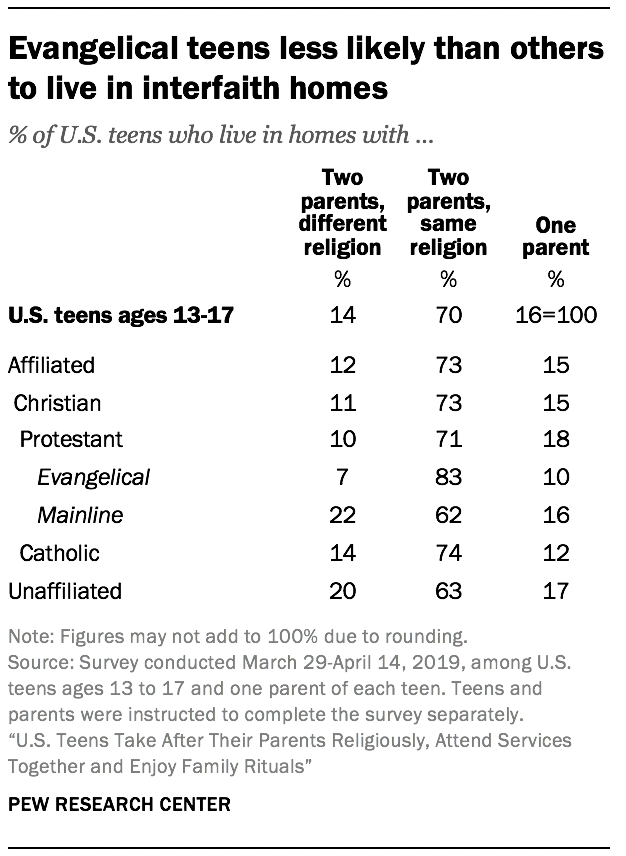 The remainder of this chapter focuses on differences between teens from interfaith homes and those from single-faith homes (see sidebar “Defining interfaith homes” below). The survey finds that seven-in-ten teens live in homes with two parents of same religion (or no religion), 14% in homes with two parents of different religions (including one affiliated parent and one unaffiliated parent), and 16% in single-parent homes.38
The remainder of this chapter focuses on differences between teens from interfaith homes and those from single-faith homes (see sidebar “Defining interfaith homes” below). The survey finds that seven-in-ten teens live in homes with two parents of same religion (or no religion), 14% in homes with two parents of different religions (including one affiliated parent and one unaffiliated parent), and 16% in single-parent homes.38
Evangelical Protestant teens are the least likely to live in an interfaith home, with just 7% living in this environment. By comparison, 14% of Catholic teens, one-in-five unaffiliated teens, and 22% of mainline Protestant teens live in interfaith homes.
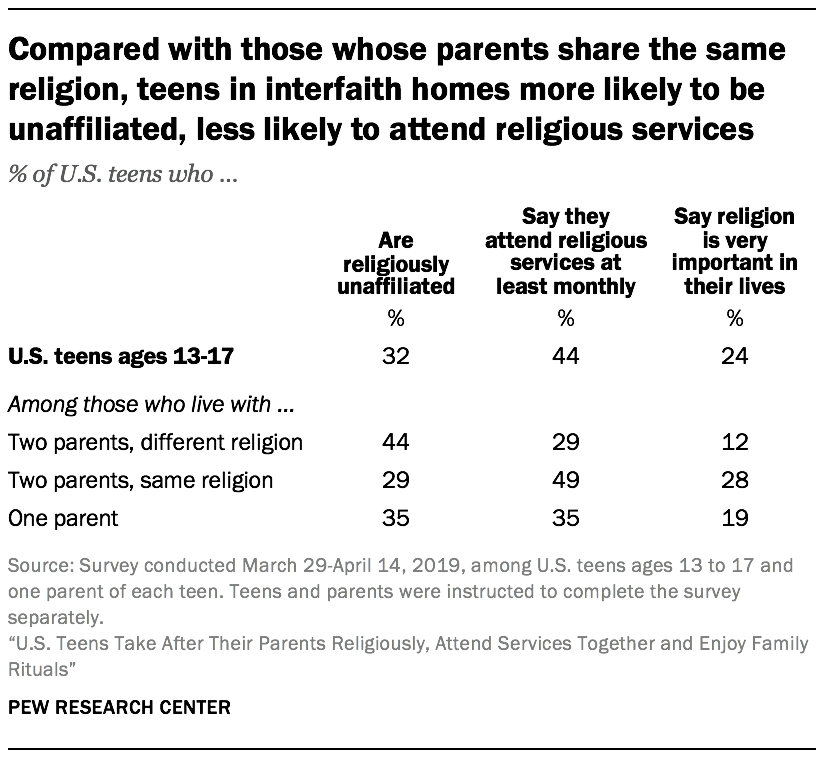 Looked at from the opposite direction, how do the religious characteristics and behaviors of teens who live in interfaith homes differ from others? Put simply, teens who live in interfaith homes are less religious than those with two parents who have the same religion.
Looked at from the opposite direction, how do the religious characteristics and behaviors of teens who live in interfaith homes differ from others? Put simply, teens who live in interfaith homes are less religious than those with two parents who have the same religion.
For example, 44% of teens who live in interfaith homes are religiously unaffiliated, compared with 29% in homes where two parents share a religion. Teens in interfaith homes also are less likely than those in homes where two parents share the same religion to attend religious services at least monthly and say religion is very important in their lives.
(Differences between those in religiously mixed households and those in single-parent households are not statistically significant.)
Defining interfaith homes
What does it mean to say an adolescent lives in an interfaith home or that they have interfaith parents? There are a variety of potential ways to define interfaith families. Is interfaith a subjective concept, based on whether members of a family view their religious beliefs and identities as different from one another? Or is it more objective, reflecting differences in family members’ formal religious affiliations? Do couples who belong to different sects or denominations of the same world religion (Christianity, for example) count as interfaith couples? Are a Catholic and a Baptist an interfaith couple, or a Methodist and a Presbyterian? Also, is it about the adults that live in an adolescent’s home, or is it about an adolescent’s biological parents, regardless of who they live with? What about if two parents have the same religious affiliation, but the adolescent is different – does that count? There is no single, correct answer to these questions.
This report focuses on the adults whom teens live with and defines interfaith homes in an objective manner based on the information provided by the responding parent. Each responding parent provided detailed information about their own religious affiliation and, if they are married or cohabiting with a partner, about their spouse or partner’s religious affiliation. These religious affiliations were grouped into the following traditions: Protestant, Catholic, Mormon, Orthodox Christian, Jehovah’s Witness, other Christian, Jewish, Muslim, Buddhist, Hindu, other world religion, other faith and unaffiliated. If the responding parent and their spouse or cohabiting partner are affiliated with different traditions, they are considered interfaith. Given these categories, a Methodist and a Presbyterian (or any other combinations of Protestant denominations) would not be considered interfaith, but a Catholic and a Protestant would be. Importantly, this measure of interfaith focuses on an adolescent’s home, not on their biological parents. And it does not define differences in belief or religious worldviews between parents as interfaith, only their religious affiliations. It also does not consider a house where a parent and teen have different religious affiliations to be an interfaith home, because the analysis seeks to explore the environment in which a teen lives and the connection that may have with the teen’s own religious identity, beliefs and practices.
When parents’ religions differ, teens give variety of responses about how they choose which one to follow
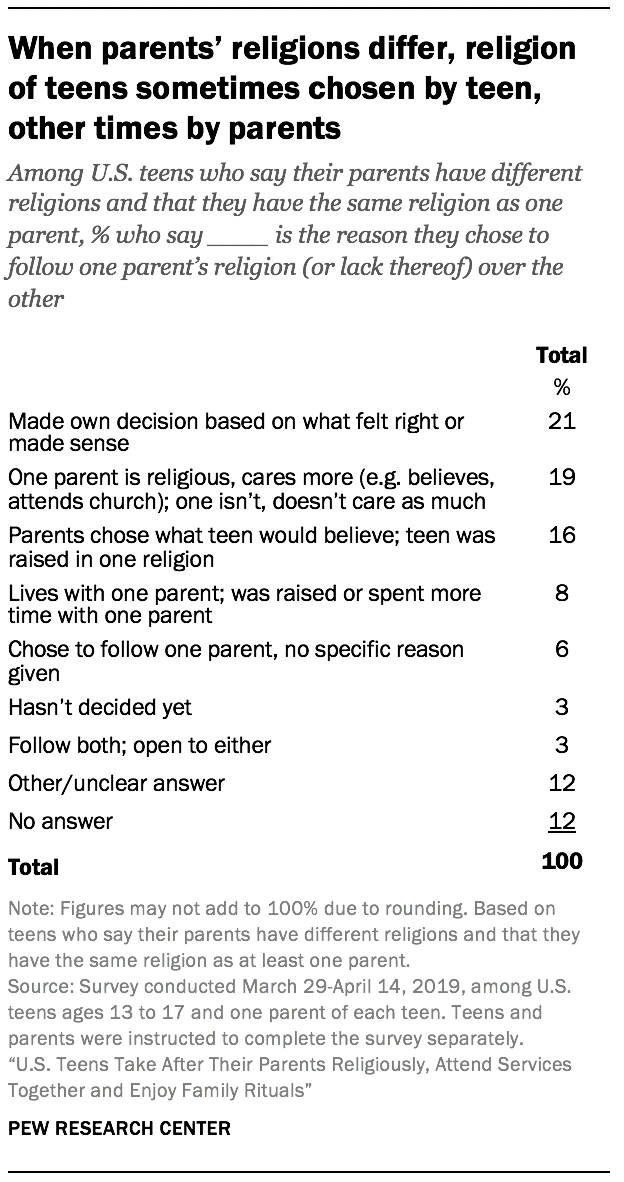 When their parents have different religions, how do teens choose which religion (or lack of religion) to follow? The survey asked teens whether their parents – all of their parents, not just the one who took the survey before them or the ones they live with – have the same religion as each other, or different religions. If the teens indicated that their parents’ religions were different and that they have the same religion as at least one of the parents, they were then asked to explain, in their own words, how they chose.39
When their parents have different religions, how do teens choose which religion (or lack of religion) to follow? The survey asked teens whether their parents – all of their parents, not just the one who took the survey before them or the ones they live with – have the same religion as each other, or different religions. If the teens indicated that their parents’ religions were different and that they have the same religion as at least one of the parents, they were then asked to explain, in their own words, how they chose.39
Roughly one-in-five teens (21%) say they made their own decision based on what felt right to them or what made the most sense. Some give general responses such as, “I just chose myself,” or “I followed what I felt was best for me.” Others provide more context. For example, “I went to church with my mother, who is Baptist and I went to church with my father, who is Catholic and from there I decided.”
A similar share (19%) say that one of their parents is more religious than the other, or that one parent cares more about religion than the other, which influenced their choice. For instance, “My dad takes me to church regularly, whereas my mom doesn’t do much of anything,” or “My dad doesn’t have one so I followed my mom’s.”
Another 16% of teens whose parents have different religions made it clear that their parent chose for them, or that they were primarily raised in the religion of one of their parents. For instance, “I was baptized as a Catholic and this was agreed upon by both of my parents so it was a mutual decision between my parents.” Similarly, “it’s what [I] was born and raised with.” This is often framed as being out of the teen’s control. Other typical responses include variations on the teen’s mother making the choice. And in some cases, teens acknowledge their lack of commitment with the religion that was chosen for them. For example, “I am Catholic because my mother makes me but I am not interested in any religion.”
Of course, families change. Another common set of responses, accounting for 8% of teens who say their parents have different religions, reflect the changing circumstances in some families by pointing to the fact that some teens were primarily raised by one of their interfaith parents. For example, “I’ve lived with my Mom my whole life, so I follow her faith.” Similarly, “my mom raised me before marrying my stepfather.”
A previous Pew Research Center study that analyzed how adult respondents were raised religiously found that mothers tend to be seen as more responsible for religious upbringing when parents have different religions, and that those from mixed religious backgrounds are more likely to adopt their mother’s religion as their own.


